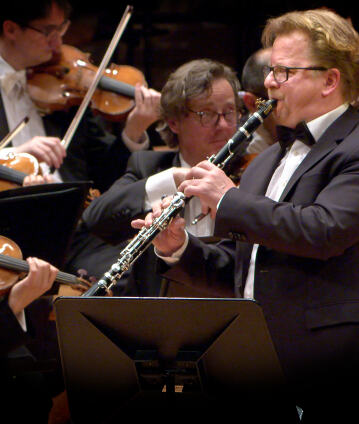Alan Gilbert and Wenzel Fuchs with Mozart’s Clarinet Concerto

Mozart was a great fan of the then still new clarinet. He composed a splendid concerto, his last work in that genre, for this instrument, whose tone closely resembles the sound of the human voice. The performers in this concert are Alan Gilbert and the Berliner Philharmoniker’s principal clarinet Wenzel Fuchs. The programme also includes Thomas Ades’s highly original Three Studies from Couperin and Debussy’s shimmering Images pour orchestra.
Since his debut with the Berliner Philharmoniker in February 2006, Alan Gilbert’s guest appearances have displayed a wide repertoire spectrum, ranging from Johann Sebastian Bach and Wolfgang Amadeus Mozart, to Felix Mendelssohn and Robert Schumann, to Johannes Brahms, Antonín Dvořák, Pyotr Ilyich Tchaikovsky, Leoš Janáček and Béla Bartók to Magnus Lindberg and John Adams. But there is method behind what looks at first glance like a piecemeal approach: “In this way I could try out quite different aspects of the orchestra”, the conductor revealed.
This season, Gilbert, who held the position of music director of the New York Philharmonic from 2009 until summer 2017, presents yet another of his musical facets to Berlin audiences – with Thomas Adès’s Three Studies from Couperin and Claude Debussy’s Images pour orchestre. What both pieces have in common is that they were inspired by existing music: Adès has orchestrated three harpsichord pieces by the French Baroque master François Couperin in a new, original way, while in his triptych Images, Debussy created three musical landscapes and mood pictures of England, France and Spain from folk dances and folk melodies. The appeal of the composition lies in the fact that Debussy, with his own iridescent musical language, created an absolutely authentic, yet at the same atmospherically heightened vision in sound of the three nations.
Wolfgang Amadeus Mozart, on the other hand, was inspired to write one of his most beautiful concertos not by pre-existing music, but by the mesmerising playing of an instrumental virtuoso: the Clarinet Concerto in A major, which captivates listeners by its clarity of form, its intimate, song-like themes and its playful brilliance. Mozart wrote the concerto for his friend Anton Stadler, whose command of the then still relatively new instrument was second to none: as one critic enthusiastically wrote, “I have never heard the like of what you contrived with your instrument. I would not have thought that a clarinet could imitate the human voice so deceptively as you imitate it. Your instrument is so soft, so delicate in tone that no-one who has a heart can resist it.” The same can also be said of the soloist of this programme: Wenzel Fuchs, principal clarinet of the Berliner Philharmoniker since 1993, received his training in Vienna and has the softness and flexibility of tone which make his playing comparable to the expressive possibilities of the human voice.
© 2018 Berlin Phil Media GmbH
Related interviews
Artists
Our recommendations
- Iván Fischer conducts Strauss and Mahler
- Philharmonic chamber music: From the First Viennese School to Modernism
- Chamber music: Philharmonic Octet Berlin
- Simon Rattle conducts excerpts from Wagner’s “Götterdämmerung”
- A “Late Night” concert with French chamber music and Simon Rattle at the piano
- Philharmonic chamber music: “Rêverie française”